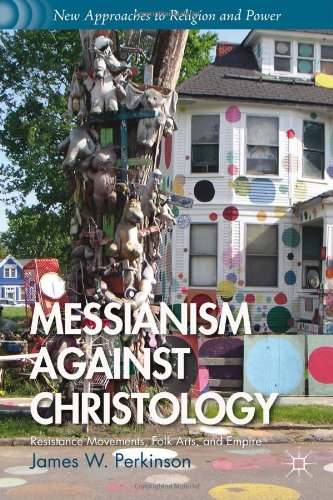|
By: Brett Gershon  New hope is growing in places of abandonment as tendrils taking back what has been subsumed by so much concrete. While large scale urban abandonment in places like St. Louis, Baltimore, and Detroit has led to conditions of crushing poverty, fragmented family-life, and bleak, inhospitable cityscapes and living conditions for those abandoned there and with no means to escape, new possibilities of life are also opening that defy the present order. For so many of us caught in the thrall of the encroaching planetary crisis (like deer in headlights), not knowing where to turn and feeling sometimes ourselves simultaneously coaxed into a dull passivity and desperately abandoned to be consumed by the appetites of the powerful, the crumbling urban center stands as both sign of ruin to come and beacon of hope and possibility. James W. Perkinson’s latest book, Messianism, Against Christology: Resistance Movements, Folk Arts, and Empire (Palgrave Macmillan, 2013) is contained within the deteriorating and vacant yet vibrant and bursting with life cityscape of urban Detroit as a road into what will be defined as “messianism”: the spirit of resistance which counters heinous and inappropriate systems of death with creative opening of new possibilities for life. Messianism breaks these possibilities wide open through the engaging of imagination and invocation of memory of prior ways of being more viable and in step with the rhythms of creation through folk mediums (storytelling, song, dance, etc.) and through embodying those memories in creative action. The spirit of messianism and the new possibilities it engenders occur under the influence and charisma of one who refuses to be contained by and who galvanizes a following against hegemonic control and into alternative economies based on reciprocity and more egalitarian lifeways. It is a sort of artful defiance that exists under any socio/political/economic order which counters oppressive power with creative energy and compassion. The spirit gets teased out first within Jesus’ own resistance movement organizing the peasants of first century Palestinian countryside against the occupying forces of the Roman empire through artistic invocation of ancestral Hebrew wisdom and later in the ways Jesus’ followers draft their memories into gospel writings. The Gospel writers have given us in their accounts creatively woven narratives of Jesus’ life and ministry handed down through folk tradition of oral storytelling and in them, as Perkinson will astutely parse out, we see Jesus putting on masks of such characters as Abel, Abraham, Mosses, David, Elijah, Daniel, and Isaiah and thereby resurrecting and tapping the power of their lives boldly lived against the orderly flow and hierarchies of power that pervaded their history as well as Jesus' own. Jesus partook in the tradition and spirit of messianism when he invoked these memories just as the gospel writers partook of the same tradition when they invoked the memory of Jesus, and all that have come after from Franciscan brothers and sisters who set out to live among the poorest of medieval society and the Diggers who claimed common land for the common good, to radical Baptists, Quaker abolitionists, and Catholic Workers partook (and partake) of that same tradition when they invoke the gospels. This is to say that messianism employs, as Perkinson describes, an “ecology of powers” as it confronts abusive authority; it does not stand alone, but is joined by the songs and stories of the ancestral “dead that refuse to die,” simultaneously tapping and drawing their power, courage, and strength and joining them in the grand story and song of liberation. And it isn’t just the Judeo-Christian traditions that are caught up in this deluge of messianic memory. The messianic was not a term that was monopolized by the figure of Jesus of Nazareth in 1st Century Palestine and while much of the scope of the book is on exegesis of canonical biblical texts and Judeo-Christian tradition read through the lens of messianism, it also looks beyond to movements past and present that exhibit messianic traits regardless of association with the rebel Jesus of Nazareth. Shaman, Martin Prechtel, founder of the Ghost Dance, Paiute Wovoka, Tupac Shakur, Grace Lee Boggs, and Detroit artist Tyree Guyton, are all drawn into this conversation. Where writers of the gospel took up the memorialization of Jesus the renegade insurgent tortured and executed by the powers that he sought to rebalance, so too did Wovoka hope to restore dignity, peace, and unity to the Lakota people through memorialization of their ancestral dead (crushed by colonization) in Ghost Dance, and so is Tyree Guyton creatively repurposing the refuse of de-industrial Detroit, resurrecting detritus into images of hope and beauty. Whether or not these alternatives name the particular person of Jesus as their source of imagination is irrelevant. Rather the challenge that messianism engenders to systems of domination as they exist in any given sociopolitical order is open to any and all expressions of culture and religion that organize around this particular political phenomenon. This does not mean the embracing of a dull universalism which attempts to unify all iterations of religion under a solitary banner, but rather it gives us the tools to connect our faith stories and traditions with a universal spirit of resistance that we see in glimpses rising in all parts of the world and moments in history where oppression is present (be it in the Black Lives Matter movement, Idle No More, or in occupied Palestine). This book is doing the arduous work of undomesticating and taking back the Christian faith from imperialist cooptation and it does this work artfully. Perkinson employs both a uniquely poetic voice and methods of reading that breathe new life into the familiar stories of Christian faith. and begs us to connect those stories to any and all struggles for justice where egregious justification of death is met by creative affirmation of life. While this is an academic text, it is no mere academic text; while Perkinson opens discourse on the tradition of messianism he also partakes in it. The pages of Messianism Against Christology are ghosted with a host of ancestral dead and their familiar stories take on new meaning and life through Perkinson’s powerful tellings. The book inspires imagination as it describes its use in messianic movements past and present, and in an age of rapidly approaching ecocide, increasing disparity of wealth, continued corporate and national takeovers of indigenous land, domestic racism and white-supremacist distribution of power, perpetual war, and a host of other interrelated powers thrown out of balance, imagination is what we so desperately need! Thus, I think this book will prove to be an invaluable resource for any faith community seeking to deepen their solidarity with various movements and struggles for justice and do so with a stronger understanding of how our faith story is deeply connected at the root level with these present struggles. As nearly 2,000 years of theologizing from the center of imperial power have rendered the roots of our faith impotent and incapable of producing the fruit of liberation, there is yet the distant sound of an old beat doing new things. If imperial centered christology demands adherence to a set of dogmas surrounding the person of Jesus of Nazareth, Perkinson’s messianism begs us to connect the stories of our faith with present struggles and daring attempts to live out alternative possibilities of life that resist domination and remember ways of being that are instep with the goodness and abundance of creation. I can see this book being utilized especially well in small study groups looking to imagine together alternative ways of living that defy and confront the present order. Unfortunately the book is currently only available as a hardback edition for a price tag that is difficult for most laity to afford or justify. I am told though that a soft bound edition for much less expensive is a future possibility. In the meantime, if the price tag is not a limitation for you, get the book, read it, and let it be an inspiration as you put your faith into practice in new and dangerous ways.
Comments
|
Disclaimer
The viewpoints expressed in each reader-submitted article are the authors own, and not an “official Jesus Radicals” position. For more on our editorial policies, visit our submissions page. If you want to contact an author or you have questions, suggestions, or concerns, please contact us. CategoriesAll Accountability Advent Anarchism Animal Liberation Anthropocentrism Appropriation Biblical Exegesis Book Reviews Bread Capitalism Catholic Worker Christmas Civilization Community Complicity Confessing Cultural Hegemony Decolonization Direct Action Easter Economics Feminism Heteropatriarchy Immigration Imperialism Intersectionality Jesus Justice Lent Liberation Theology Love Mutual Liberation Nation-state Nonviolence Occupy Othering Pacifisim Peace Pedagogies Of Liberation Police Privilege Property Queer Racism Resistance Resurrection Sexuality Solidarity Speciesism Spiritual Practices Technology Temptation Veganism Violence War What We're Reading On . . . White Supremacy Zionism ContributorsNekeisha Alayna Alexis
Amaryah Armstrong Autumn Brown HH Brownsmith Jarrod Cochran Chelsea Collonge Keith Hebden Ric Hudgens Liza Minno Bloom Jocelyn Perry Eda Ruhiye Uca Joanna Shenk Nichola Torbett Mark VanSteenwyk Gregory Williams Archives
October 2017
|
Search by typing & pressing enter


 RSS Feed
RSS Feed